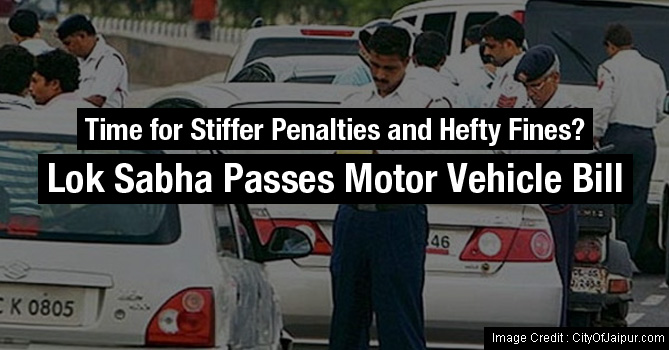Traffic violators – watch out! The new Motor Vehicles (Amendment) Bill 2016 has just been passed by the Lok Sabha and it comes with more teeth to ensure stringent penalties and punishment for those who violate traffic rules and norms. It’s also going to make travelling by road, safer.
Traditionally, India has always taken a lenient view of all those who take to the roads and end up violating rules in some form or the other. The very few who do get caught, get away with a mild rap on the knuckles that barely serves as a deterrent.
With radical reforms now introduced, the Bill will result in introducing 100% e-governance that will lead to greater transparency, speedier implementation of licensing procedure, minimizing corruption by unscrupulous officials from licensing to highway interventions, and improving road safety.
Here are some of the significant reforms that will affect all the stakeholders:
Getting a Driver’s License Made Easier and More Transparent
The process of acquiring a driver’s license in India is one of the easiest and simplest of government documents anyone can get hold of anywhere in the world. The entire exercise is mostly a formality, where money dictates how quickly one can get hold of a permanent driver’s licence, and that too without ever having to visit the licensing authority or passing any driving test.
With the new Bill, that’s going to change – for the better. The entire application process will now become online, where one can get a learner’s licence without having to visit the Road Transport Authority (RTA) or contacting any tout.
For the permanent driver’s license, the applicant will only have to attend and mandatorily pass the driving test before being approved for the licence. So, whether one is a VVIP or an ordinary citizen, the process will apply to all.
100% E-governance Ushers in Transparency
The entire process of vehicle registration will go online, which will make vehicle registration, tracking and monitoring – faster and more transparent. This will also make vehicle theft and illegal sale, next to impossible.
Road Safety Gets Priority
Human life and safety is paramount and the new Bill recognises that. India, unfortunately, has a poor track record on road safety – recording some of the highest number of road accidents and fatalities anywhere in the world.
Take a look at some of the alarming statistics:
- In 2015-16, India witnessed 5,01,423 road accidents, which resulted in 1,46,133 fatalities and left the remaining persons injured. The sheer number of new vehicles introduced on roads each year has outpaced the expansion of road carrying capacity and the road network, across India.
- The national highways recorded 24.8% of all road accidents, followed by state highways with 24%, with all other roads collectively recording 47.6% of all accidents.
- The state with the maximum number of accidents, per lakh population, is Goa, which is five times the national average. The state to record the highest number of fatalities from road accidents, per lakh population, is Tamil Nadu, while Kerala tops the list of maximum injured.
With these alarming numbers, the Motor Vehicles (Amendment) Bill 2016 couldn’t have come at a better time. India is signatory to the Brasilia Declaration which aims to reduce road accident fatalities by 50% by 2022.
The Minister of Road Transport and Highways Nitin Gadkari, on Monday, reiterated the government’s resolve to bring down the number of road accident fatalities by 50% within five years.
Several Offences Will Attract More Stringent Penalties and Punishment
During the debate in Parliament, some members pushed for compensation to road accident victims to be increased to Rs 20 lakh in case of death. This proposal was defeated through a voice vote with 221 votes against and 37 in favour.
The reason given was the compensation hike would significantly drive up the accident insurance premiums, which will make it unaffordable for a large segment of road users. The Bill caps the maximum liability of third-party insurers to Rs 10 lakh in case of death, and Rs 5 lakh in case of grievous injuries. However, it was clarified that there would be no cap on the amount of compensation paid by insurance companies.
Focus on Improving Road Design and Quality
The Bill aims to making the concerned road authorities responsible for road safety by improving road design, road signages and road quality.
For instance, 19.6% of all road accidents occur due to head-on collisions. This points to the urgent need for road barriers between to-and-fro directions. 47.9% of accidents occur due to excessive speed. This points to an urgent need for improving road monitoring and management. The Bill addresses all these issues.
Taxi Aggregators Will Now be Better Regulated
The new Bill also addresses the need to regulate the increasing taxi aggregators on the road. The central government will now issue guidelines for states to follow when issuing permits to taxi aggregators. This will help improve customer safety and experience, while ensuring taxi aggregators are not harassed unnecessarily by RTA and Traffic Police officials.
Vehicle Manufacturers Made Answerable for Vehicle Defects
Vehicle defects and lack of safety measures for vehicle users have resulted in significant loss of life and caused injuries to many people. Thus far, vehicle manufacturers were not held accountable. Not anymore. The new Bill makes it mandatory for vehicle manufacturers to recall vehicles on the road to repair or replace defective parts that may endanger the safety of users. Failure to do so will attract heavy fines and penalties.
Let’s hope that the new Motor Vehicles Bill will result in meeting the 50% target of reducing road accidents well before 2022. Each life counts.






